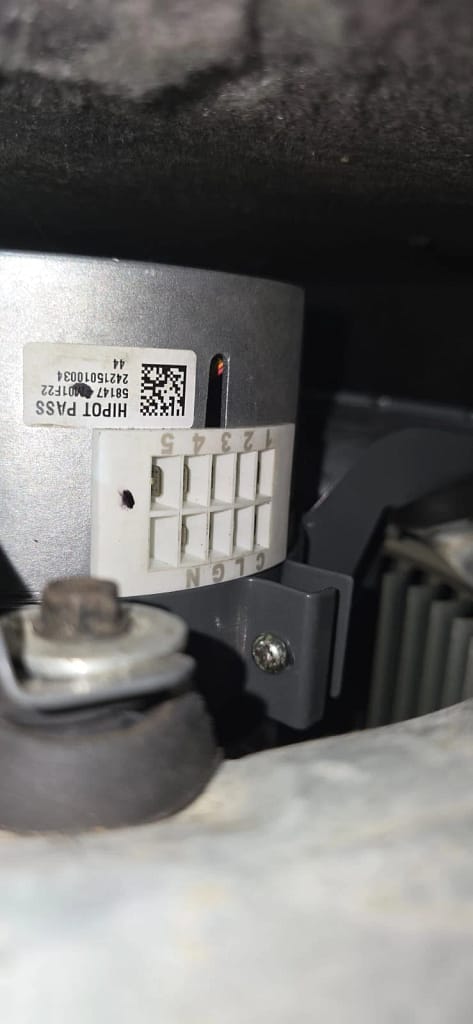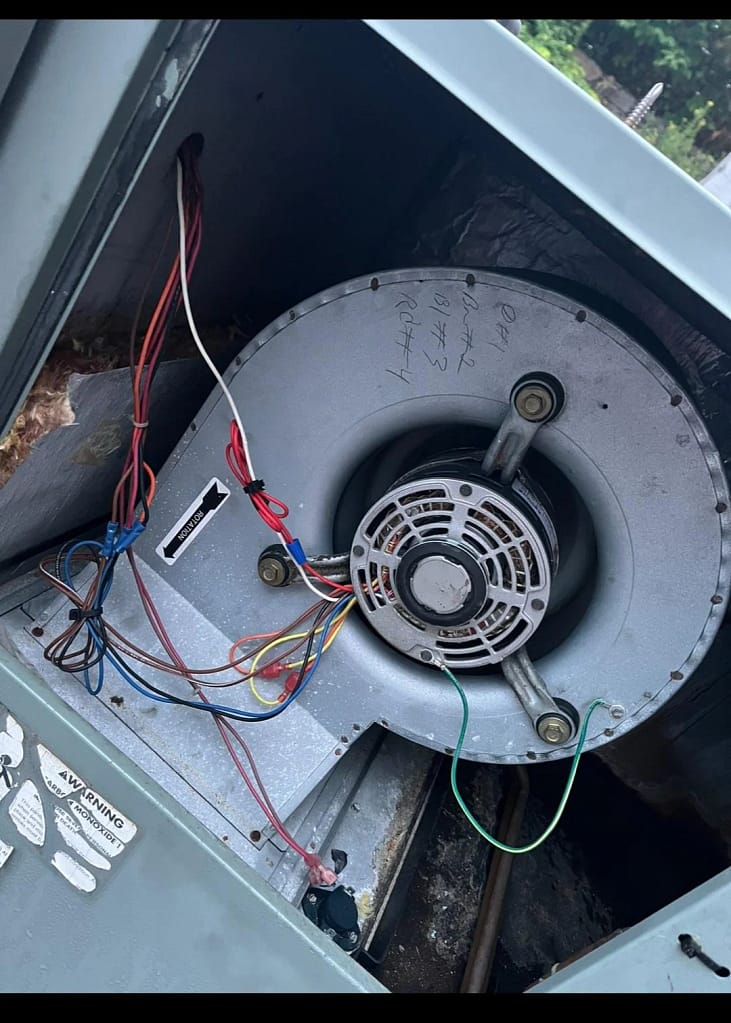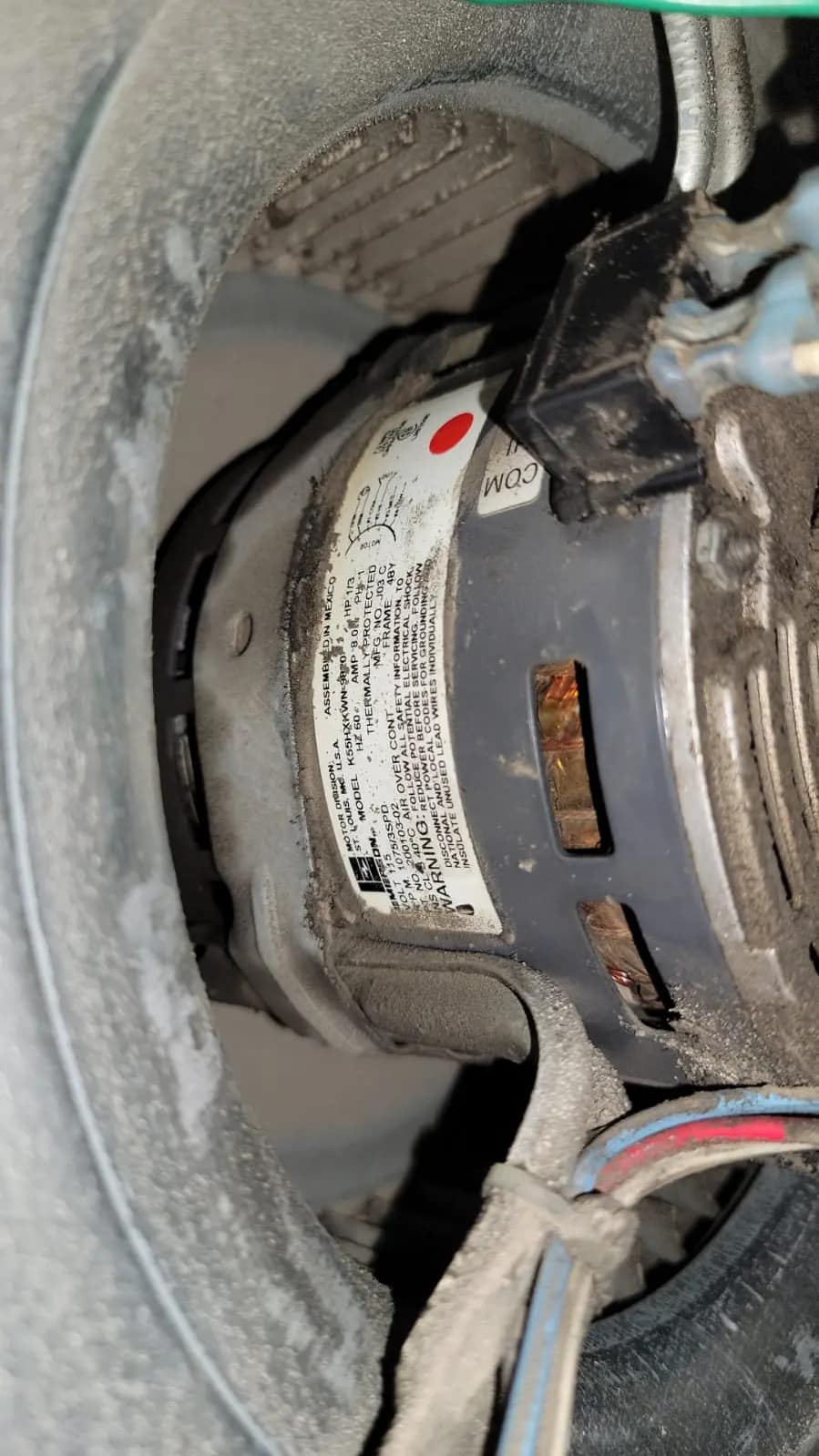More often than not, when your air conditioner seems to have given up the ghost, the problem is the HVAC blower motor not working. This motor is responsible for pushing that wonderfully conditioned air through your vents and into your living spaces. When the AC unit’s blower motor is not working, your home quickly becomes an oven. While a malfunctioning AC is frustrating, many blower motor issues can be diagnosed and sometimes even fixed. Let’s dive into understanding why your AC might be failing you and what steps you can take.
Common Symptoms of a Failing AC Blower Motor
Understanding the “why” behind your blower motor issues can guide your troubleshooting efforts. Problems can broadly be categorized into electrical, mechanical, airflow, and control issues.
Electrical Problems (Fuses, Capacitors, and Wiring)
Electricity is the lifeblood of your AC system, and many AC blower motor not working failures stem from electrical issues.
Wiring: Loose, corroded, or damaged wiring can interrupt the electrical flow to the blower motor. This might be due to age, vibrations, or even pests chewing through wires.
Fuses: Just like in your car or home electrical panel, your HVAC system has fuses designed to blow and protect components from power surges or overloads. A blown fuse specific to the blower motor can completely cut off power, leading to your blower motor AC not working.
Capacitors: The capacitor is a small, cylindrical component that gives the blower motor the initial electrical “kick” it needs to start spinning. Over time, capacitors can weaken or fail, preventing the motor from starting up or running efficiently. A bad capacitor is a very common reason for an AC blower motor not working.

Mechanical Failures (Motor and Components)
Beyond electricity, the physical components of the motor itself can wear out.
- Motor Failure Causing AC blower motor not working: Like any mechanical part with moving pieces, the blower motor simply has a lifespan. Bearings can seize, windings can burn out, or the motor itself can just give up due to age and continuous use.
- Blower Wheel: The blower wheel, also known as a squirrel cage, is a fan-like component attached to the motor shaft. It can become clogged with dirt and debris, throwing off its balance and putting strain on the motor. In rare cases, it can even break.
- Belt Issues (Older Systems): While most modern HVAC systems use direct-drive blower motors, older units might have a belt connecting the motor to the blower wheel. A worn, slipping, or broken belt will prevent the blower wheel from turning.
Airflow and Maintenance Issues
Sometimes, the problem isn’t directly with the motor, but with factors that put undue strain on it.
- Clogged Air Filters: This is perhaps the most common and easily preventable AC blower motor not working issue. A heavily clogged air filter restricts airflow significantly. The blower motor has to work much harder to pull air through, leading to overheating, reduced efficiency, and premature wear.
- Blocked Vents or Return Grilles: Furniture, curtains, or even playful pets can block supply or return air vents, creating resistance for the blower motor.
- Dirty Blower Wheel: As mentioned earlier, a dirty blower wheel covered in dust and grime can become unbalanced and less efficient, forcing the motor to work harder.
Control and Thermostat Problems
Finally, the signals telling your blower motor what to do can be interrupted.
- Thermostat Malfunction: Your thermostat is the brain of your AC system. If it’s faulty, it might not be sending the correct signals to the blower motor to turn on or off. Incorrect settings can also be a factor in your AC blower motor not working.
- Control Board Issues: Modern HVAC systems have complex control boards that manage all the different components. A faulty control board can prevent the blower motor from receiving power or the correct operational commands.
DIY Troubleshooting Steps: How to Diagnose the Problem?
Alright, now that we know the symptoms and potential causes, let’s get our hands (a little) dirty. Remember, safety is paramount.
Safety First: Power Down Your System
Before you touch anything inside your HVAC unit, ALWAYS turn off the power at the circuit breaker. This usually involves flipping a switch labeled “AC,” “Furnace,” or “HVAC” in your main electrical panel. You might also find a service disconnect switch near your outdoor unit or air handler. Confirm the power is off by trying to turn on the system at the thermostat after you’ve flipped the breaker. This step to handle your AC blower motor not working cannot be emphasized enough: electricity is dangerous.
Check the Thermostat and Settings
It sounds simple, but sometimes the easiest solution is the right one.
- Batteries: If your thermostat runs on batteries, replace them.
- Settings: Ensure your thermostat is set to “Cool” mode and the fan is set to “Auto” or “On.” If it’s set to “Off,” that’s why there’s no airflow! Also, check if the temperature setting is lower than your current indoor temperature.
Inspect Electrical Components (with caution)
With the power off, you can visually inspect some electrical components to fix your AC blower motor not working.
Visual inspection of the capacitor: The capacitor is typically a cylinder, usually silver or black, with two or three terminals on top. Look for any signs of bulging, leaking, or scorch marks on the capacitor. A bulging top is a clear indicator of failure no just your AC blower motor not working. Even when the power is off, a capacitor can hold a residual charge that can be dangerous. Do not touch the terminals with your bare hands. If you need to physically test or remove it, use insulated tools or call a professional.
Locating and checking the fuse box: Your indoor air handler or furnace might have a small automotive-style fuse, usually a purple or brown blade fuse (similar to those in your car). It’s often located on the control board. If it’s blown, the wire inside will be visibly broken.

Look for Airflow Blockages
- Check your air filter: Pull out your air filter. Is it thick with dust and grime? If so, replace it with a clean one. This alone can often restore proper airflow and prevent future strain on your blower motor.
- Inspect return and supply vents: Ensure all your supply registers (where cool air comes out) and return air grilles (where air goes back into the system) are unobstructed by furniture, rugs, or other items.
- Access the blower wheel: If comfortable and with power off, you can often access the blower wheel by opening a panel on your indoor air handler. Look for excessive dirt buildup on the fins of the squirrel cage. If it’s heavily caked, it needs cleaning.
Listen for Strange Noises
With the power on (briefly, if you suspect issues), listen carefully. Can you hear a hum but no fan movement? This often points to a bad capacitor or a seized motor not only your AC blower motor not working. Squealing indicates bad bearings. These auditory clues are crucial for pinpointing the source of the problem.
When to Call a Professional: Knowing Your Limits
While DIY troubleshooting can save you time and money, there are definite limits to what you should attempt. Knowing when to call in an expert is crucial for your safety and the longevity of your AC system.
When Electrical Testing is Required?
If visual inspections of fuses and capacitors don’t reveal obvious problems, and you’re not comfortable using a multimeter to test for voltage or capacitance, it’s time to call a professional. Working with live electricity is extremely dangerous and should only be done by trained individuals. They have the right tools and expertise to safely diagnose complex electrical faults.
Complex Component Replacement (Capacitor, Motor, Control Board)
While a handy individual might feel confident replacing a simple fuse, tackling a capacitor, the entire blower motor, or a control board is a different story if your AC blower motor is not working.
- Capacitor: As mentioned, capacitors can hold a dangerous charge. Professional technicians know how to safely discharge and replace them.
- Blower Motor: Replacing a blower motor is a significant job that requires disconnecting wiring, potentially disassembling parts of the air handler, and correctly installing the new motor. It’s a precise task that, if done incorrectly, can lead to further damage.
- Control Board: These are the brains of your system. Replacing a control board requires specific knowledge of wiring diagrams and system compatibility. One wrong connection can short out other components or render your entire system inoperable.
The Importance of Professional Diagnosis
Sometimes, the symptoms can be misleading. A professional AC repair service can quickly and accurately diagnose the root cause of your AC blower motor not working. They have specialized diagnostic tools and years of experience to pinpoint issues that might not be obvious to the untrained eye. For instance, what looks like a simple motor problem could be a symptom of a much larger issue, like a refrigerant leak (which might involve the cost to repair a leaking AC unit) or an issue with the outdoor unit that impacts the indoor fan. An expert can provide a comprehensive assessment and recommend the most effective and safe solution.
Preventative Maintenance for a Healthy Blower Motor
An ounce of prevention is worth a pound of cure, especially when it comes to your AC system and AC blower motor not working. Regular maintenance can significantly extend the life of your blower motor and prevent many common issues.
Regular Filter Changes: Your First Line of Defense
This cannot be stressed enough. Changing your air filter regularly (every 1-3 months, depending on usage and household conditions like pets) is the single most important thing you can do for your AC system. A clean filter ensures proper airflow, reduces strain on the blower motor, improves indoor air quality, and keeps your system running efficiently. This also helps prevent issues like your AC running constantly.
Scheduling Annual HVAC Tune-Ups
An annual HVAC tune-up by a qualified technician is invaluable. During a tune-up, they will:
- Inspect and clean the blower motor and wheel.
- Check electrical connections and test the capacitor.
- Lubricate moving parts (if applicable).
- Check refrigerant levels and inspect for leaks.
- Inspect the condensate drain line (preventing the need for AC drain repair).
- Test thermostat functionality and overall system performance.
These routine checks can catch minor issues before they escalate into major, costly repairs like AC blower motor not working.
Keeping Vents Clear and Unobstructed
Make it a habit to regularly check that all your supply and return air vents are clear of furniture, curtains, toys, and anything else that might block airflow. This ensures your blower motor doesn’t have to overwork itself to push or pull air through your home.
Blower Motor Problems? Get Reliable AC Repair from 24SevenAC!
When your AC unit blower motor not working, and you’ve tried the basic troubleshooting steps, or if the problem feels beyond your comfort zone, it’s time to call in the professionals. For reliable AC repair service, look no further than 24SevenAC. We specialize in comprehensive HVAC solutions, from intricate blower motor repairs to full AC installation service.

We understand the urgency of a broken air conditioner, especially in the heat. Our skilled technicians are equipped to diagnose and resolve a wide range of AC issues, ensuring your home stays cool and comfortable. Whether you’re dealing with a humming blower motor, no airflow, or any other AC problem, our team is ready to help. We proudly serve communities in Texas, including Tyler and Houston, providing prompt, efficient, and trustworthy service. Don’t let a faulty blower motor leave you sweating; contact 24SevenAC today for expert assistance.
Conclusion
An AC blower motor not working can bring your home comfort to a screeching halt. By understanding the common symptoms, potential causes, and basic troubleshooting steps, you can often identify the problem yourself. However, always remember the importance of safety and knowing when to defer to a professional. Regular maintenance, particularly changing your air filter and scheduling annual tune-ups, is your best defense against premature blower motor failure. When in doubt, or for complex repairs, don’t hesitate to reach out to a trusted AC repair service like 24SevenAC. Your comfort is worth it!




